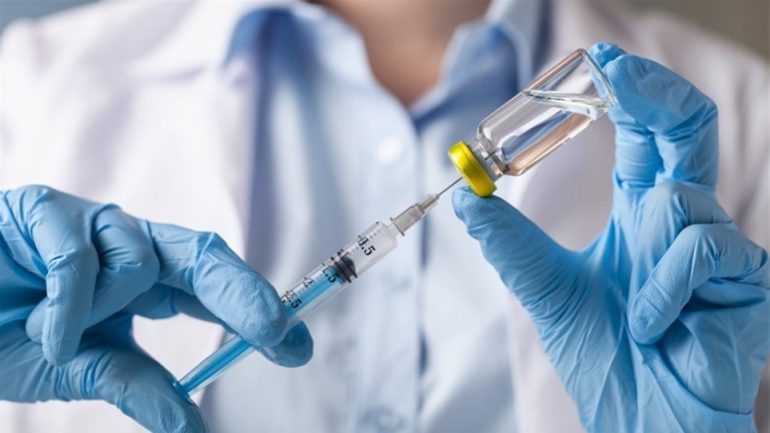Prescribing seasonal flu vaccines began as early as last week, with scientists making a double bet this year: reducing the pandemic-causing infections and putting a strong brake on the spread of the flu virus in the community. And as a warning, we should not be complacent as there is little immunity to the flu due to last year's low circulation, at a time when the parallel relaxation of measures creates conditions for a resurgence.
Influenza is a contagious disease of the respiratory system caused by the flu virus. It can cause mild to severe illness and sometimes even death. According to the data, the elderly, young children and people suffering from certain chronic diseases are at greater risk of serious complications of the flu.
The long-term follow-up of the disease in Greece shows that the activity of the seasonal flu usually starts to increase in January, while it peaks in the months of February - March. According to reports from the European Center for Disease Control and Prevention (ECDC) and EODY, influenza activity was particularly low during 2020-21 in all European countries, possibly due to public health measures taken to address the pandemic. coronavirus.
In any case, this winter remains… uncharted as, among other things, the time of onset of the seasonal flu epidemic wave can not be accurately predicted, but often with its onset there is a disorganization of professional and social life, excessive increase in drug consumption and not rarely, increased mortality.
Important measures to limit the spread of influenza are the systematic application of personal hygiene measures (eg frequent hand washing), the isolation of sufferers and the avoidance of confinement indoors. However, these measures are partially effective and - although significant - they are insufficient.
High risk winter. From the beginning of the pandemic, scientists have been anxious about the effects of a possible release of SARS-CoV-2 and the seasonal flu virus. But the lockdowns and the observance of the personal protection measures, in practice αν drove out the flu during the last two winters.
"Until today, we do not have clear knowledge to what extent they can influence each other. We know that last year we were fortunate that the mobility of the flu was extremely low, thanks to the implementation of hygiene measures and avoidance of coloration. The flu peaks in January, February, March and the people who need to be vaccinated, must be immunized from November ", pointed out recently the president of the National Vaccination Committee, Maria Theodoridou.
She herself explained that anyone who belongs to the vulnerable groups "does not need to solve a chronological crossword puzzle to make other vaccines. The dose of the vaccine is one and the vaccine does not interfere with the shape of the other vaccines. There are no recommendations for maintaining intervals ".
Therefore, the flu vaccine can be given even on the same day as the vaccine against Covid infection or pneumococcus. The only limitation is that the. Sting is done at different anatomical points.
According to the National Vaccination Program of our country, the influenza vaccination must be applied systematically and as a priority to people (adults and children) who belong to the following groups of increased risk:
1. People aged 60 and over.
2. Children (6 months and older) and adults with one or more of the following aggravating factors or chronic diseases:
Chronic respiratory diseases, such as asthma, chronic obstructive pulmonary disease
Heart disease with severe hemodynamic disorder
Immunosuppression (hereditary or acquired)
Organ transplantation and bone marrow transplantation
Sickle cell anemia (and other hemoglobinopathies)
Diabetes mellitus or other chronic metabolic disease
Chronic kidney disease
Chronic liver disease
Neurological-neuromuscular diseases
Down Syndrome.
3. Pregnant, regardless of gestational age, pregnant and breastfeeding.
4. People with morbid obesity (Body Mass Index> 40Kg / m2) and children with BMI> 95nU.
5. Children taking long-term aspirin (eg for Kawasaki disease, rheumatoid arthritis, etc.).
6. People who are in close contact with children under 6 months of age or who care for or live with people with an underlying illness, which increases the risk of influenza complications.
7. Closed populations, such as staff and internal students (schools, military and police schools, special schools, etc.), new recruits, institutions for the chronically ill and nursing homes, detention facilities.
8. Employees in areas of health services (medical staff, other employees, students of health professions in clinical practice) and in accommodation centers for refugees-immigrants.
9. Homeless.
10. Veterinarians, poultry farmers, pig farmers, breeders, slaughterers and generally people who come into regular contact with birds or pigs.
It must be administered in a timely manner
The flu vaccine should be given early and before the onset of the usual flu-onset period, as it takes about two weeks to achieve an immune response.
According to the relevant circular of the Ministry of Health, preferably the vaccination should be completed at least 4-6 weeks before the start of the annual flu epidemic in Greece (ie in the middle to the end of November).
Vaccination is continued throughout the seasonal flu for people for whom vaccination is indicated and who have not been vaccinated in time. Influenza vaccination generally involves only one dose of the vaccine per year.
In which cases should the vaccine be postponed?
Due to the evolving pandemic, experts set some time limits for the administration of the flu vaccine in relation to the infection. COVID-19.
Asymptomatic or pre-symptomatic patients with a positive laboratory test COVID-19 they should get the flu vaccine as soon as they have completed their isolation.
Asymptomatic individuals who have come into contact with a confirmed case COVID-19 and have a negative laboratory test can be vaccinated normally.
Symptomatic patients with infection COVID-19 they should postpone their vaccination until their isolation is complete and the symptoms of the disease subside.
in.gr
